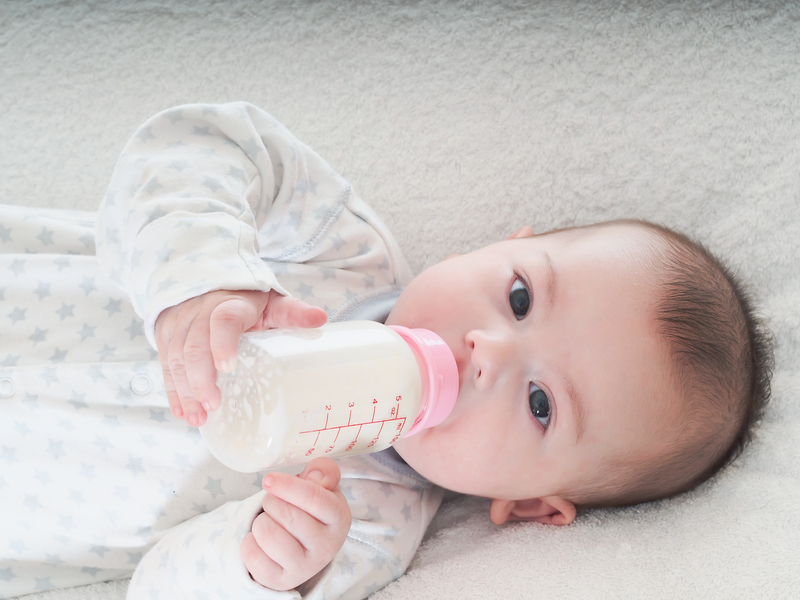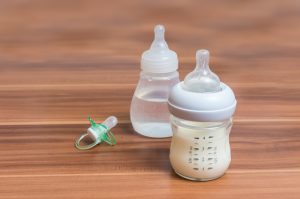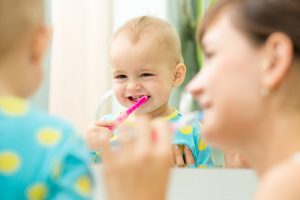Preventing Baby Bottle Tooth Decay
Permanent Retainers: How Long Will You Need One?
January 23, 2018Oral Milestones in Your Child’s Life
February 12, 2018
Tooth decay in infants and toddlers is generally referred to as “baby bottle tooth decay”. This happens if a baby is put to bed with a bottle or is often given a bottle instead of a pacifier to soothe them. Once a baby receives their first tooth, parents must be vigilant in brushing their teeth and cleaning their gums to avoid tooth decay. Even though the baby teeth will eventually fall out, that won’t begin to happen until around age 8, and they can even last until age 12. Start your baby’s oral health off right by avoiding baby bottle tooth decay that can affect their childhood oral health!
The First Baby Teeth
Infants are not born with a full set of teeth. These teeth come in over time, with the first tooth erupting around 6 months of age. However, some infants will receive teeth as early as 3 or 4 months or after their first birthday. The first teeth in the mouth to erupt will be the front bottom two teeth and then the front top two teeth. The following teeth to erupt will be the teeth on either side of the central teeth both on top and bottom, and so on until all the teeth have come in. An infant and child will only have 20 teeth in their mouth, and these are referred to as the “baby teeth”.
Baby teeth are generally a tad spaced out in the mouth. This is to make room for permanent teeth that will come in later on in life. Eventually, these baby teeth will fall out. However, great care must go into taking care of the baby teeth. They get tooth decay even easier than the permanent, adult teeth. During childhood, you want to make sure you take special care to brush a child’s teeth several times a day to avoid tooth decay. You also want to make sure that a child’s bite is aligned properly, or this could cause severe problems later on in life. If a child’s bite or alignment is off, they can develop speech impediments and speech problems as well as have trouble with biting and chewing. To see if your child has an orthodontic issue, bring them into our office once all the baby teeth have grown in. This is around age 7 or 8 according to the American Association of Orthodontics.

Tooth Decay in Children
We mentioned tooth decay in infants and children. You will know tooth decay by its other name of “cavity”. Children get cavities from plaque, which coats even the baby teeth. They get plaque from the foods and drinks they consume, which eventually causes cavities. You don’t want a child to get tooth decay or lose their baby teeth before they are supposed to. You also want good oral health habits in infancy and childhood so they keep their teeth healthy all throughout their life. One of the biggest risks for tooth decay in infants is baby bottle tooth decay.
Baby Bottle Tooth Decay
You might have guessed it from the title, but baby bottle tooth decay happens when a baby is left to suck on a baby bottle during the night. Baby bottle tooth decay also happens if the baby has had a bottle for a prolonged amount of time. This all happens if a bottle with milk is used to soothe the baby throughout the day instead of a pacifier. Babies generally get baby bottle tooth decay after their first tooth has erupted in the mouth. This is because once there’s a tooth, sugars can attack it and cause tooth decay. Help avoid baby bottle tooth decay by:
- Never putting a baby to bed (even naptime) with a bottle
- Using a pacifier instead of a baby bottle to soothe a baby
- Never putting juice, soda or other drink (besides milk) in a baby’s bottle
- Not sharing saliva with a baby by licking spoons or pacifiers
- Never dipping a pacifier in sugar or honey

Cleaning Children’s Teeth
Parents must take an active role in brushing their children’s teeth and teaching them to do it. Once a tooth pops through the gums, it’s susceptible to tooth decay. That means, once that first tooth comes out, you must clean it as well as the gums. After a bottle or nursing, get a damp cloth and clean the gums of any leftover milk. Get in the habit of doing this before the baby’s first tooth comes in. After a child’s teeth come into the mouth, you want to brush those teeth at least twice a day.
For an infant, use a rice-size amount of toothpaste. For a child, use about a pea-size amount of toothpaste. Use an infant brush or gum brush when a baby is small. When they are older, graduate to a child trainer toothbrush when they are a few years old. There are many different sizes of toothbrushes. Change your child’s toothbrush every 3-4 months and as they get older, get a slightly larger toothbrush. An adult toothbrush will be too large for a child.
Free Infant Dental Exam
We offer a free infant dental exam for children 18 months and younger. If you suspect your baby has baby bottle tooth decay, make sure to come into our office as soon as possible. For your free consultation, you can always call Hardy Pediatric Dentistry & Orthodontics at 720-887-6003!